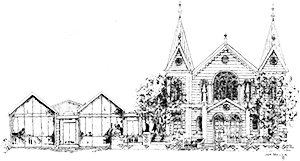Our Methodist Tradition
The Methodist Movement
Methodism is a worldwide movement dating from 1729, when a group of students at the University of Oxford, England, began to assemble for worship, study and Christian service.
Among the Oxford group were John Wesley, considered the founder of Methodism, and his brother Charles, the sons of an Anglican rector. John preached, and Charles wrote hymns. Together they brought about a spiritual revolution, which some historians believe diverted England from political revolution in the late 18th century. Preaching the doctrines of Christian perfection and personal salvation through faith, John Wesley quickly won an enthusiastic following among the English working classes, for whom the formalism of the established Church had little appeal.
John Wesley’s message as well as his personal activities among the poor encouraged a social consciousness that was retained by his followers and has become a hallmark of the Methodist tradition.
The Methodist Church of New Zealand
We are part of the Methodist Church of New Zealand. Methodist missionary work in New Zealand began in 1822. Missionaries from Britain initially ministered to the largely Maori population, and later to the new migrants.
As migration from other Pacific countries has continued, ethnic groupings of Samoan, Fijian and Tongan members have assumed a greater and stronger identity within the life of the church, making a significant contribution to its diversity and richness.
In 1983 the Methodist Church of New Zealand decided to move towards becoming a bi-cultural church. This recognizes the 1840 Treaty of Waitangi which was entered into by two parties representing the original people of the land and the later immigrant populations. In subsequent years the church has worked at ways of developing equality in decision-making, stronger partnerships and the sharing of resources with the Maori section of the church, which now has its own autonomy within the life of the Methodist Church.

